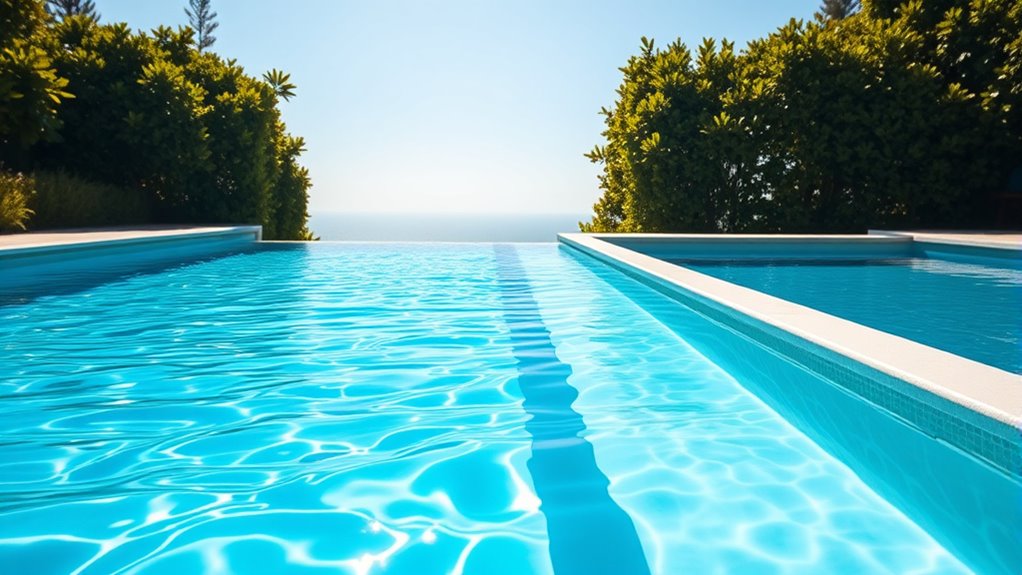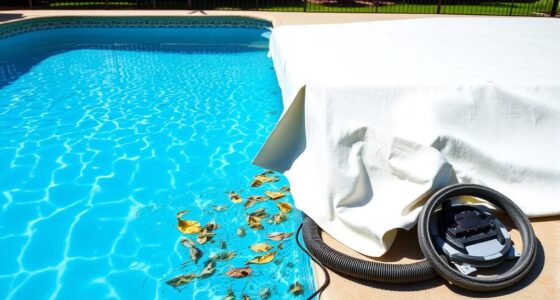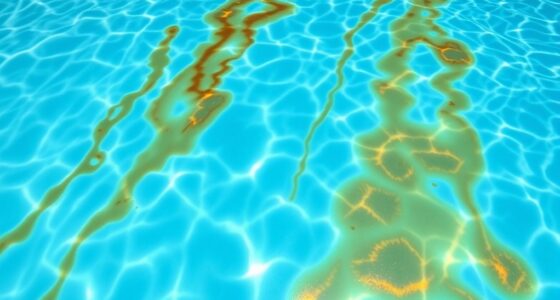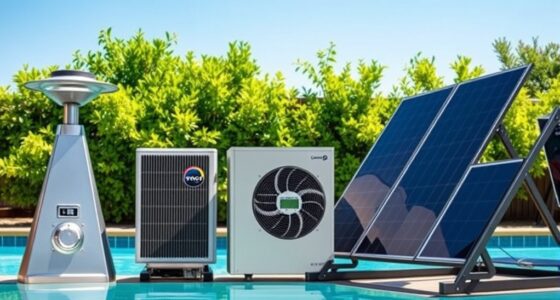Saltwater pools typically cost more initially but offer benefits like gentler water that causes less skin, eye, and hair irritation, plus longer-lasting equipment thanks to better corrosion resistance. Chlorine pools are cheaper upfront and easier to maintain but need regular chemical adjustments and may cause more discomfort. Both options impact the environment differently, with saltwater pools being more eco-friendly. To make the best choice, consider long-term durability, maintenance, and comfort — more details to come.
Key Takeaways
- Saltwater pools typically have higher initial costs but offer gentler water, less skin and eye irritation, and longer equipment lifespan.
- Chlorine pools are more affordable upfront but require ongoing chemical additions and maintenance.
- Saltwater systems generate fewer harmful chemicals, reducing environmental impact and supporting sustainable pool operation.
- Equipment in saltwater pools is more corrosion-resistant, leading to reduced long-term maintenance and longer-lasting components.
- Chlorine pools provide easier chemical management but may cause more skin, eye irritation, and faster equipment deterioration.
Cost and Installation Considerations
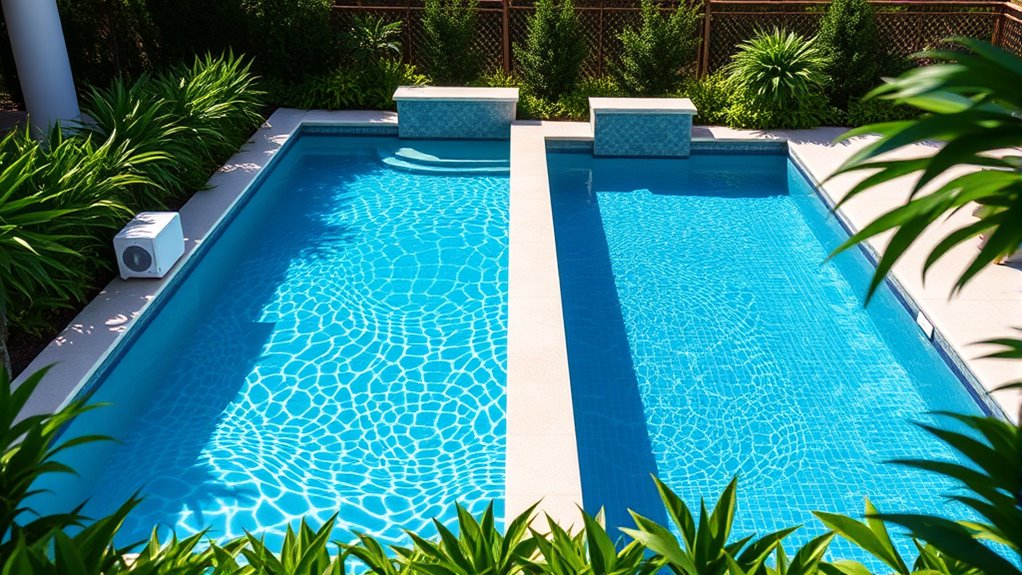
When comparing saltwater and chlorine pools, the initial setup costs and installation requirements can substantially influence your choice. Saltwater pools generally have higher installation costs because they require a specialized salt chlorination system, which adds to the equipment expenses. You might also notice that structural requirements are more demanding; saltwater pools often need corrosion-resistant materials to prevent damage from salt exposure. Additionally, the corrosion resistance of pool materials is an important factor to consider for longevity. Chlorine pools typically have lower upfront costs and simpler installation, relying on standard chlorine feeders and pumps. However, over time, maintenance costs may differ. If you prefer a straightforward setup with minimal structural modifications, a chlorine pool might be more suitable. Conversely, if you’re willing to invest more initially for longer-term benefits, a saltwater pool offers a different experience. Additionally, the costs and installation considerations are important factors that can affect your decision-making process.
Maintenance and Chemical Usage

Maintenance and chemical usage differ considerably between saltwater and chlorine pools. Saltwater pools rely on a salt-chlorine generator to produce sanitizer, requiring you to monitor pool chemistry regularly to keep sanitizer levels balanced. Regular testing is essential to ensure proper chemical balance and prevent issues like algae growth or cloudy water. Saltwater systems often incorporate high-efficiency technology, which can reduce overall energy consumption and maintenance costs. To keep your pool safe and clear, you’ll want to:
- Regularly test and adjust pH and sanitizer levels
- Maintain proper salt levels in saltwater pools
- Clean and inspect equipment to ensure efficient chlorine generation
- Understand how Kia Tuning can optimize your vehicle’s performance and longevity
While saltwater pools typically need less chemical addition, their maintenance revolves around managing salt and ensuring the generator functions correctly. Chlorine pools demand ongoing chemical input, but both require consistent monitoring to maintain safe, clean water.
Effects on Skin, Eyes, and Hair
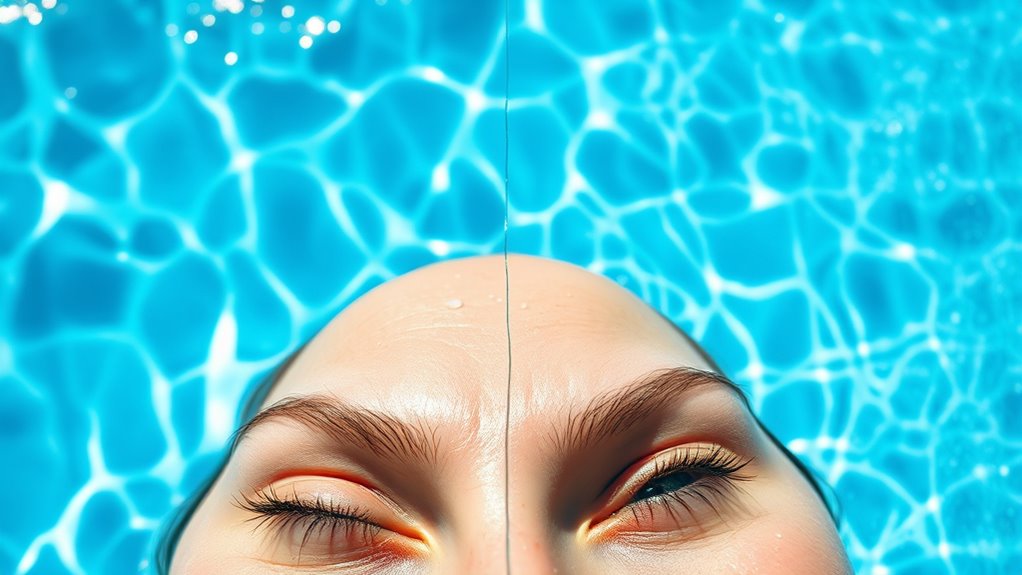
Saltwater pools are often gentler on your skin, eyes, and hair compared to traditional chlorine pools. You may experience less skin irritation and reduced eye sensitivity, making swimming more comfortable. Saltwater’s lower chemical levels help prevent dryness and irritation, especially for sensitive skin. However, some individuals still notice mild reactions, so it’s important to monitor your response. Additionally, ongoing research highlights the importance of AI Security in ensuring safe and reliable AI systems in various industries. Embracing the wisdom of balance and harmony, as seen in ancient Egyptian teachings, can remind pool owners of the importance of maintaining optimal water chemistry for health and safety.
Environmental Impact and Safety
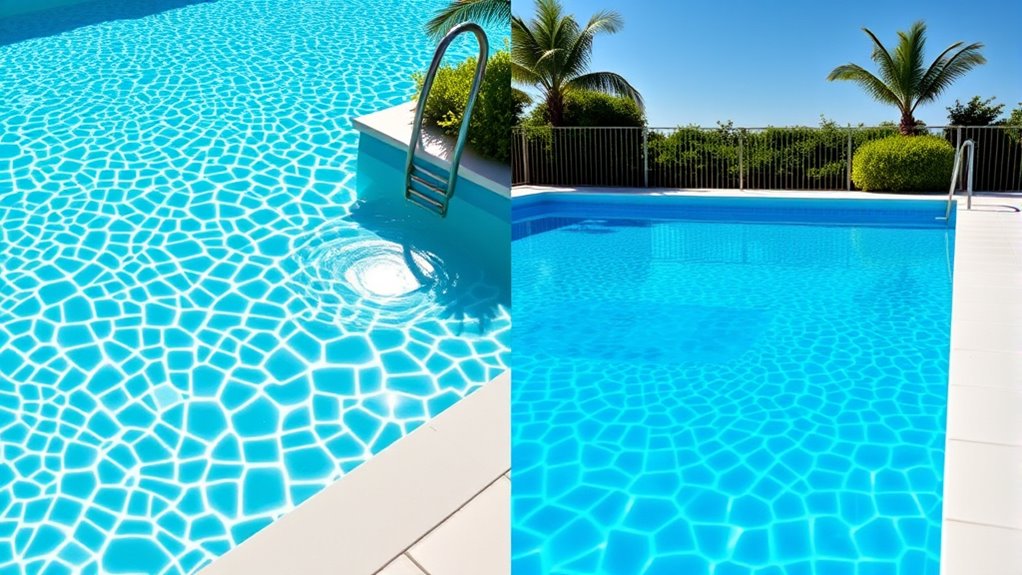
You should consider how each pool type impacts the environment, especially regarding chemical use and potential risks. Saltwater pools generate fewer harmful chemicals, but they still have some effects on nearby ecosystems. Understanding these differences helps you make safer, more eco-friendly choices for your pool. Additionally, saltwater systems can reduce the need for frequent chemical treatments, contributing to a more sustainable pool maintenance routine. The chemical balance in saltwater pools is typically easier to manage, which can further reduce environmental impact. Moreover, the use of home furnishings like automatic chemical feeders can help maintain consistent water quality with less manual intervention. Being aware of environmental impact factors can guide you toward more environmentally responsible pool ownership. Incorporating sustainable practices such as solar heating or energy-efficient pumps can further lessen the ecological footprint of your pool.
Chemical Usage and Risks
While saltwater pools often seem like a safer and more eco-friendly option, they still involve chemical processes that pose environmental and safety concerns. Maintaining proper chemical balance is vital to prevent issues like skin irritation, eye discomfort, and respiratory problems. Although saltwater pools generate chlorine from salt, they still require additional chemicals to stabilize the water. Chlorine generation process is complex, and improper management can lead to health risks if these chemicals are misused or overused, leading to potential allergic reactions or long-term effects. Keep in mind:
- Over-chlorination can cause skin and eye irritation
- Improper chemical balance increases bacterial growth
- Handling chemicals poses safety hazards if not managed correctly
- Crochet kits for beginners can help in understanding safe handling and maintenance of pool chemicals.
Proper monitoring of chemical levels is essential for ensuring water safety and minimizing risks. Additionally, understanding the Horsepower of Electric Dirt Bikes can give insights into the energy demands of pool systems and their maintenance.
Understanding these risks helps you guarantee safe, balanced water, regardless of your pool type.
Ecosystem Effects
Have you considered how your pool affects the environment beyond your backyard? Saltwater pools tend to be more eco-friendly because they produce fewer harmful chemicals, reducing water pollution. However, their salt levels can still impact marine life if pool water leaks into natural water sources. Chlorine pools, on the other hand, often introduce chemical runoff that can harm aquatic ecosystems and disrupt marine life. Both types require careful maintenance to prevent contamination, but improper handling can lead to water pollution that affects local wildlife and ecosystems. Reducing chemical use and properly managing pool discharge helps protect the environment. Additionally, water treatment systems can help minimize chemical runoff and further lessen ecological impact. Implementing proper disposal methods for pool chemicals is crucial to prevent environmental contamination. Ultimately, choosing a pool system with eco-conscious practices minimizes negative effects on marine life and supports a safer, healthier ecosystem.
Long-term Durability and Equipment Life
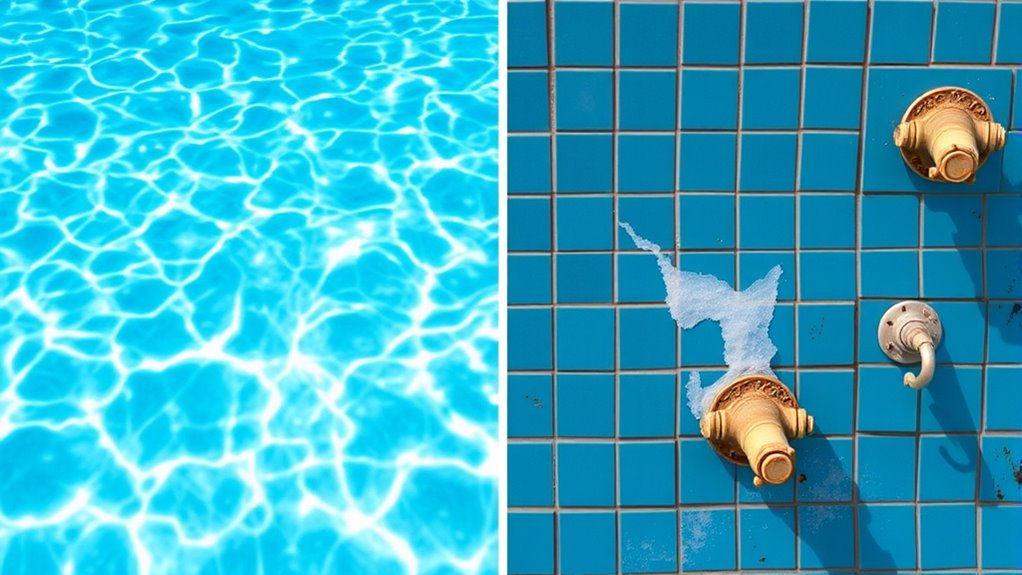
You’ll notice that saltwater pools tend to have more corrosion issues over time, especially with equipment not designed for salty conditions. Chlorine pools generally put less stress on equipment, leading to longer-lasting components with proper maintenance. Considering these differences can help you choose a system that fits your long-term durability needs. Additionally, understanding equipment maintenance requirements for each system can significantly impact their lifespan. For example, corrosion resistance of pool components plays a crucial role in their durability and is often enhanced in chlorine systems. Moreover, selecting equipment with corrosion-resistant materials can further extend the longevity of pool components in saltwater environments. Regular inspections and protective coatings can also mitigate corrosion risks and prolong equipment life. Proper chemical balance management is essential in both systems to prevent damage and ensure longevity.
Corrosion Resistance Differences
Saltwater pools generally offer better corrosion resistance than chlorine pools, which can substantially extend the lifespan of your pool equipment and structure. This improved corrosion resistance means the materials used in saltwater systems tend to withstand the harsh saline environment longer. As a result, your equipment stays functional and durable over time, reducing replacement costs. Key benefits include:
- Enhanced material durability, minimizing rust and deterioration
- Longer-lasting pumps, filters, and heaters
- Reduced maintenance for corrosion-related issues
- Incorporating natural materials in pool components can further enhance longevity and resistance to corrosion.
- Understanding corrosion processes helps in selecting appropriate materials and maintenance routines to maximize equipment lifespan.
Because saltwater is gentler on metals and plastics, your pool’s components maintain their integrity longer. This durability not only saves money but also keeps your pool running smoothly for years. Choosing a saltwater system can deliver significant advantages in managing corrosion and boosting overall equipment longevity, especially when combined with proper maintenance practices.
Maintenance Impact on Equipment
While saltwater pools benefit from superior corrosion resistance, proper maintenance plays a vital role in guaranteeing long-term equipment durability. Regularly monitoring the salt levels, pH balance, and sanitizer levels helps reduce corrosion potential, which can otherwise shorten equipment lifespan. You should clean and inspect your pool’s filters, pumps, and salt chlorinators frequently to catch early signs of wear or corrosion. Using compatible pool chemicals and avoiding abrupt chemical changes also minimizes stress on equipment. Consistent maintenance helps prevent buildup and corrosion, extending equipment longevity. Without proper care, even saltwater systems can suffer damage over time, decreasing their lifespan and increasing repair costs. Staying diligent with maintenance ensures your pool equipment remains reliable and lasts longer, regardless of the water type. Additionally, understanding water chemistry and how it influences equipment health is crucial for optimal pool operation.
User Experience and Swimming Comfort
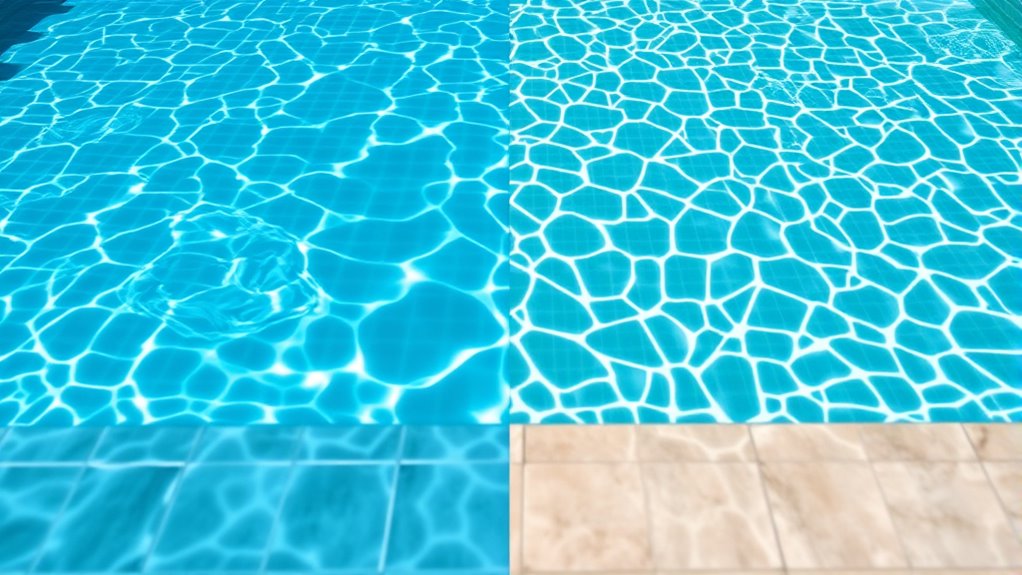
Many swimmers find that saltwater pools offer a gentler, more comfortable experience compared to traditional chlorine pools. The comfort level is generally higher because saltwater is less harsh on your skin, eyes, and respiratory system. You’ll notice a softer water feel and less irritation after swimming. Additionally, the water taste in saltwater pools tends to be milder, which makes breathing easier and less disruptive. To enhance your experience, consider these tips:
- Use swim goggles to protect your eyes from irritation
- Rinse off after swimming to reduce salt buildup on your skin
- Maintain proper salt levels for ideal comfort and water quality
Frequently Asked Questions
Which Type of Pool Is More Suitable for Allergy Sufferers?
If you’re an allergy sufferer, you want a pool that minimizes allergy triggers and respiratory issues. Saltwater pools generally produce fewer irritants and use less harsh chemicals, making them a better choice for sensitive eyes and lungs. Chlorine pools, however, can release chloramines, which may worsen allergies and respiratory problems. So, for comfort and health, saltwater pools are often more suitable, reducing your exposure to common allergy triggers.
How Do Saltwater Pools Affect Surrounding Landscaping?
You’ll notice that saltwater pools can impact your landscaping by increasing salt buildup around the area, which may cause salt corrosion on nearby plants and materials. This landscaping impact means you might need to choose salt-tolerant plants or create barriers to protect your greenery. Regular maintenance helps minimize salt buildup, but being aware of these effects lets you plan for a beautiful, resilient landscape that can withstand the saltwater environment.
Are There Any Health Risks Associated With Saltwater Pools?
Oh, the irony—thinking saltwater pools are completely risk-free! While they might seem gentler, you still need to stay on top of pool maintenance and water safety. Saltwater can cause skin irritation or eye discomfort if not balanced properly. Plus, high salt levels might harm your skin or even cause corrosion. So, yes, there are health risks, but with proper care, you can enjoy safe, invigorating swims.
Can Saltwater and Chlorine Pools Be Combined or Hybridized?
Yes, you can combine saltwater and chlorine pools through hybrid pool systems that use salt chlorine integration. These systems generate chlorine from salt, reducing the need for traditional chlorine chemicals while maintaining clean, safe water. By choosing a hybrid setup, you benefit from the advantages of both methods, such as softer water and easier maintenance, giving you more control over your pool’s water chemistry and overall experience.
What Are the Best Options for DIY Installation of Each Pool Type?
For DIY installation, you can build a chlorinated pool using standard materials and a reliable chlorination system, which simplifies pool maintenance and setup. Saltwater pools require installing a salt chlorine generator, which might be more complex but offers softer water and less chemical handling. Both options need careful planning, proper tools, and safety precautions. You should follow detailed guides and consider professional advice to guarantee a safe, effective, and low-maintenance pool.
Conclusion
Whether you prefer the pristine simplicity of saltwater or the traditional touch of chlorine, weighing the pros and cons helps you make the best choice. Consider costs, comfort, and cleanliness to create your perfect pool paradise. By understanding the differences, you’ll design a durable, delightful aquatic escape that suits your style. Immerse yourself in decision-making with confidence, and enjoy every splash, swim, and swim session in your stunning, safe, and satisfying sanctuary.
